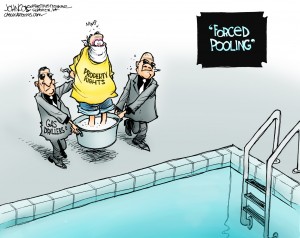The West Virginia forced pooling bill — HR 2688 — would, under certain circumstances, force a reluctant landowner to sell their mineral rights — eminent domain for private corporations.
It was written by out of state oil and gas lobbyists.
On March 4, 2015, HR 2688 passed the West Virginia House of Delegates by a vote of 60 to 40.
On the last day of the legislature March 14 at 12:38 pm, it passed the West Virginia Senate — with only minor non substantive amendments — by a vote of 24 to 10.
Because of those minor changes, it had to be voted on by the House of Delegates — again.
This time, the House rejected it on March 14 at 10:52 pm — by a vote of 49 to 49.
What happened?
Eleven Democratic members of the House of Delegates went from voting yes on March 4 to no on March 14.
Those members were House Minority Leader Tim Miley (Harrison), Brent Boggs (Braxton), Andrew Byrd (Kanawha), Sean Hornbuckle (Cabell), Clif Moore (McDowell), Jim Morgan (Cabell), Rick Moye (Raleigh), David Pethtel (Wetzel), Doug Reynolds (Cabell), Stephen Skinner (Jefferson), and Harry White (Mingo).
Justin Marcum (D-Mingo) went from voting yes to not voting.
Linda Phillips (D-Wyoming) went from no to not voting.
Eric Householder (R-Berkeley) went from no to yes.
“Initially, I believed that pooling offered greater safeguards for the environment because it would mean fewer well pads,” Skinner told Morgan County USA. “After the initial vote, I heard from constituents and had a great dialogue about the merits and pitfalls of pooling. I think that the protection of property rights outweighs the benefits of this particular bill.”
In Morgan County, Senators Charles Trump (R-Morgan) and Craig Blair (R-Berkeley) both voted yes.
Delegates Saira Blair (R-Berkeley) and Daryl Cowles (R-Morgan) both voted no.
The oil and gas industry had a slew of lobbyists working the bill, while those opposed had one lobbyist — Tom Susman — hired last Monday by landowners near New Martinsville, West Virginia.
Those landowners and others formed a group calling itself the West Virginia Property Rights Coalition and began running an advertisement on statewide radio opposed to the ad. (Listen here to radio ad.)
“In America, we have constitutional property rights. And HB 2688 violates our property rights,” the ad said. “Today, it’s minerals. And tomorrow, will it be your farm or your house?”
“It is your property. And you should decide whether you want to sell it or not.”
“House bill 2688 is wrong. Government should not allow private companies eminent domain powers. HB 2688 is wrong. Taking your property for another may be okay in Russia, but not in America.”
Susman said he knew that the late night Saturday vote by the House was going to be close — within two votes.
“Even though the West Virginia Farm Bureau came out in favor of the bill, local farm bureaus began to peel off,” Susman said. “I was told that the Ohio County farm bureau was opposed and the Harrison County farm bureau was opposed.”
“Small oil and gas landowners and producers were peeling off — they felt that the law was written by the large oil and gas companies in such a way that they could control the market.”
“After the first House vote, delegates began getting calls from back home,” Susman said. “Many delegates were having a case of voter’s remorse.”
Susman says that it was a true left right alliance that killed the bill.
“You had 28 Democrats voting against, coupled with the entire 21 members of the Liberty Caucus in the House voting against,” Susman said.

